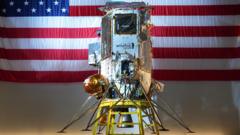In a bid to harness the growing appetite for electricity driven by artificial intelligence, Chevron has announced its intention to develop natural gas power plants that will cater directly to data centers.
Chevron Enters A.I. Power Generation Race Amidst Energy Demand Surge

Chevron Enters A.I. Power Generation Race Amidst Energy Demand Surge
Chevron plans to build natural gas power plants to supply energy directly to data centers, tapping into the booming A.I. industry.
The artificial intelligence revolution is generating a notable surge in electricity demand, prompting energy companies, particularly in the oil and gas sector, to rethink their strategies. Chevron, a notable player in the industry, has partnered with the investment firm Engine No. 1 to construct natural gas facilities aimed at supporting this burgeoning field. The company has reported that it is currently in the process of procuring essential equipment, scouting potential sites, and is optimistic about becoming operational within three years.
“It’s a chance for us to help meet the moment and address this growing need for reliable and affordable power,” stated Mike Wirth, Chevron’s CEO. This move by Chevron is indicative of a broader trend among oil companies adapting to the electricity demands of tech-focused economies. Their pivot to power generation reflects an acknowledgment of the directive market shift, as evidenced by Exxon Mobil’s similar announcement last month regarding its intent to engage in electricity sales to data centers.
Despite these positive strides by energy producers, the future of A.I. and its increasing energy needs is shrouded in uncertainty. Recently, technology and energy stocks experienced significant declines, driven by investor uneasiness regarding advancements made by a lesser-known Chinese company, DeepSeek. This company claims to have achieved remarkable A.I. innovations utilizing a limited number of energy-efficient computer chips, a fact that sparked a 17% drop in shares of leading chip-maker Nvidia and a staggering 20% fall for Constellation Energy.
This distinct intersection of the energy industry and the relentless pace of A.I. advancement continues to evolve, marking a transformative period for both sectors. As Chevron and other oil companies navigate this shifting landscape, the ultimate interplay between energy supply and technological development remains close watch for stakeholders and investors alike.
“It’s a chance for us to help meet the moment and address this growing need for reliable and affordable power,” stated Mike Wirth, Chevron’s CEO. This move by Chevron is indicative of a broader trend among oil companies adapting to the electricity demands of tech-focused economies. Their pivot to power generation reflects an acknowledgment of the directive market shift, as evidenced by Exxon Mobil’s similar announcement last month regarding its intent to engage in electricity sales to data centers.
Despite these positive strides by energy producers, the future of A.I. and its increasing energy needs is shrouded in uncertainty. Recently, technology and energy stocks experienced significant declines, driven by investor uneasiness regarding advancements made by a lesser-known Chinese company, DeepSeek. This company claims to have achieved remarkable A.I. innovations utilizing a limited number of energy-efficient computer chips, a fact that sparked a 17% drop in shares of leading chip-maker Nvidia and a staggering 20% fall for Constellation Energy.
This distinct intersection of the energy industry and the relentless pace of A.I. advancement continues to evolve, marking a transformative period for both sectors. As Chevron and other oil companies navigate this shifting landscape, the ultimate interplay between energy supply and technological development remains close watch for stakeholders and investors alike.




















